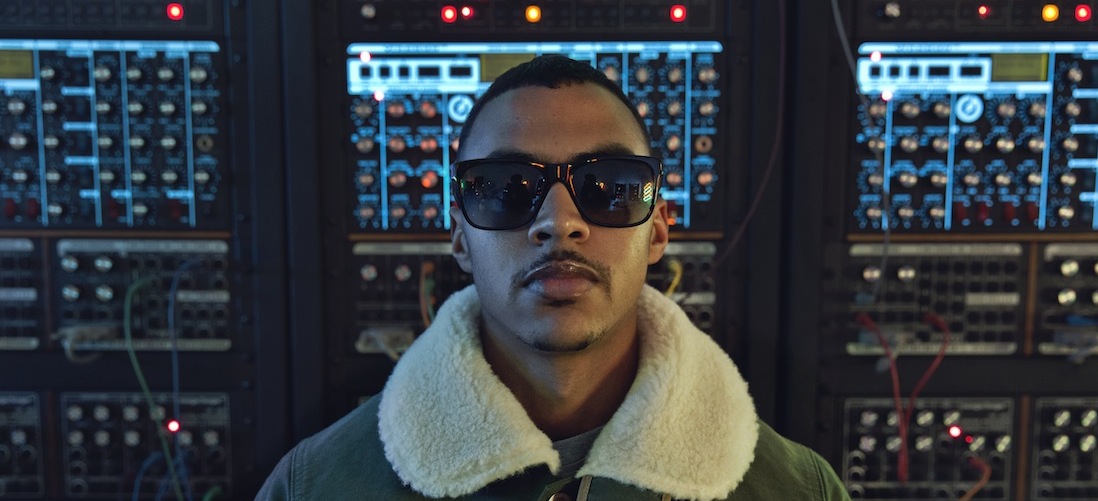Interview: Swindle
Don't fake the funk: The London artist connects the global bass diaspora.

Interview: Swindle
Don't fake the funk: The London artist connects the global bass diaspora.

When choosing to commemorate a moment, most people will settle for a photo—likely a poorly framed Instagram shared in a hurry to say “I’m here now and having fun!” But Cameron Palmer, the London musician known as Swindle, doesn’t really take photos. When he landed in Cape Town two years ago for an overnight show to promote his Long Live The Jazz album, he was so taken aback by the beauty of the coastal town and the people he met there that he cancelled his return flight and stayed to make music. “I found myself in places I knew I might not have the chance to go back to. Certain vibes I was never gonna get at home. I wanted to document me being there,” the 28-year-old explains as he relaxes in the shade of a Brooklyn backyard on a hot August afternoon. “This music is something for me to listen back to and remember.”
The track Palmer created in Cape Town, “Find You” (featuring local vocalist Nonku Phiri), was more than just a reminder of a time and place. It was the first step towards a new album he didn’t know he would be making. This September, two years after his eureka moment, Peace, Love & Music is being released via the Butterz label. The album documents Swindle’s relentless touring over the past few years, his desire to make music that does “the old thing a new way,” and his dedication to remaining honest.

Palmer grew up in the south London suburb of Croydon, raised on a diet of funk and electronic music. He began collecting records at age ten and DJing at 12. Jungle was an early love—but by the time Palmer ventured into clubs or raves, the music had changed and no longer attracted him. Instead, it was grime that he gravitated towards, a new London music that would define both his generation and the mood of the country in a decade of depression and social anxiety. It was a bit ironic, too, as Croydon is perhaps best known today as the home of dubstep, rather than grime. “I wasn’t so attached to the dubstep movement,” he explains. “I felt like I was on my own down there. So I’d go out east and check out the Butterz crew, before it was a thing. Terror Danjah also helped me out a lot. I’d go to a studio in Greenwich and link up with grime MCs.”
In 2007, Palmer self-released the The 140 Mixtape, a collection of grime tracks featuring MCs such as NoLay, Big Narstie and Ghetto. Three years later, he made his official debut via Planet Mu, and in 2011 he put out his first release on Butterz, the grime-minded label, collective and club night founded by DJs Elijah and Skilliam that Palmer had been involved with since the start. Recognition from the dubstep scene came in 2013 when Deep Medi, the label founded by scene pioneer Mala, released Long Live The Jazz, an ambitious and intoxicating mixture of Palmer’s childhood love of funk and fusion with the gritty edge and rumbling low end of grime and dubstep. The LP was a collision of aesthetics and eras, a meeting of the old and the new that defines Palmer’s work. It also helped put him on the road for more than two years as a solo DJ, keys player for the Mala In Cuba live show, and as the leader of his own band.
Across its sixteen tracks, Peace, Love & Music acts as a collection of musical postcards from Palmer’s extensive travels. The album references cities and parties, in both name and content, that have made an impact on him: Tokyo, Los Angeles, South Africa, Shanghai, the Philippines, Amsterdam, Glasgow and Denver. It plays out like a tour would for Palmer, ending back in London where JME jumps on “Mad Ting” for a few choice bars, over a riddim that comes across like a big band clashing FruityLoops.
Palmer’s two favorite American cities are represented on the album early on. The second track, “London To L.A.,” is dedicated to the city of angels and features the vocals of Ash Riser. It was LA’s affinity for funk that first attracted Palmer, and last year he made it a temporary home for a few months in winter. Most recently he was surprised to see the crowd recite grime bars at a local party, word for word. Next is Denver, with a dedication to the local Sub.Mission party and the Cervantes venue. The song opens on a recording of Palmer telling the crowd that he “only made this for Denver” and until the album came out, no one but those in attendance at Sub.Mission have ever heard the music.
Each track on Peace, Love & Music that’s named for a destination was created with a similar process and intent, twisting the concept of exclusive productions. “Tokyo” was written on his return from a first trip to the Japanese capital in 2013. A week later he went back, to play keys for the Mala In Cuba live show, and tested an early version of the song while DJing the longstanding DBS party. In 2014, he again returned and captured crowd noises and words from Japanese DJ Nisi-P, with whom he had first toured the country. Once home, he added a chorus of horns to give the song a finishing touch.
More than simply providing a document of Palmer’s personal experiences, and allowing everyone to hear the music, Peace, Love & Music also acts as a connection between the members of the global bass diaspora Palmer has bonded with over the years. “Now DBS in Tokyo can check for Sub.Mission, and vice versa,” he explains before admitting that this was a calculated move. “You go to all these places and realize that no matter how different people are, the intent is always the same.”
It’s conventional wisdom that artists today make their money from touring. Aside from the generalization that of that statement, such precepts also ignore that the road isn’t always the best place from which to create. Artists need releases to tour—but can’t always write new material while touring. It can be difficult to channel bursts of creativity into something meaningful when you’re constantly moving and staying up late to work. For those who create largely within the limitless digital space of a laptop, writing on the road might be an option, but that’s not how Palmer operates. “I need volume and keyboards,” he affirms in his south London accent.
“The minute you lie about music, it will punish you for that”
Half of Peace, Love & Music was written on the road, and Palmer went about solving the problem of creativity-in-transit the only way he knew how to: He asked where the nearest studio he could use was. In Cape Town that meant sessions at the local Red Bull studio, while in places like the Philippines the approach led him to some unexpected places. “Someone said there’s an old man in the mountains I could go record with in a bamboo studio, with all bamboo instruments.” The result is “Malasimbo,” a laid-back composition propelled by wooden percussion and the singing of Hilarius Dauag. “I couldn’t have planned that. The guy I made it with doesn’t even have a phone. It’s completely honest. The collaborations in this album are in no way contrived. It’s all people I came across.”
Honesty is something Palmer comes back to regularly during conversations. He talks about being honest with music, that the number one rule is to never lie with it. Later on, he states that “the minute you lie about music, it will punish you for that”—and he says it all with a conviction that’s infectious. Instead of faking the funk, Palmer has found his own niche, best described by his motto “do the old thing a new way.” He blends the softness of strings and horn arrangements, composed with help from his band members, with the blunt edges of bass and beats. It’s the perfect synthesis of funk and grime, the two genres he loves. He’s quick to point out that they share a similar etymology: “You don’t get closer than that in a way.” Palmer is now so comfortable with his approach that he may never again use synthesized instruments, even if it’s only for his own satisfaction. “A lot of people ask me where my samples come from, but I don’t sample. The musicians just play,” he explains.
Palmer’s approach brings to mind the work of contemporaries like Flying Lotus, who first began to add musicians to his beats with 2010’s Cosmogramma—or even Kendrick Lamar’s latest album, crafted by jazz kids from LA and making use of classical arrangements to augment the power of the songs. In the worlds of electronic and dance music, people like Palmer remain the exception rather than the rule, despite the fact that many trained musicians hide behind the beats blasting onto dancefloors worldwide. Palmer attributes the situation to a lack of role models, or perhaps to people still seeing the two—instruments and computers—as different. There’s also an inherent difficulty and monetary costs associated with taking such a route, something that Palmer knows only too well. He takes a hit on every live show with his band, choosing to sacrifice profit for artistic integrity as a form of long term investment.

For the past five years, Butterz have championed their own strain of London club music with over twenty releases from a range of local artists, regular parties at home and extensive touring. Their approach respects the artistic individuality that makes the best grime special, while promoting a collective mindset that has sometimes been missing from the music. The decision to finally take the jump with a full-length album was one that founder Elijah didn’t want to rush. “This album feels like all the things we wished we could do when we first met in 2009,” he explains by e-mail. “Traveling the world, meeting other musicians and bringing them together on a project like this.” Palmer, for his part, has been integral in the presentation and roll-out of the album, handling videos, artwork and a promotional plan that sees him touring across the Americas in the two months leading to the release.
“I wanted do to the album on my own,” Palmer admits. “Doing it with Butterz gives me that freedom. They’re not doing this for the money, they’re doing it to make sure I can do it.” After five years of touring and releases on various labels, to issue Peace, Love & Music via Butterz feels like the only logical move for Palmer. “After all of this, I go back home.”
Peace, Love & Musicis out now; the “Global Dance”/”Mad Ting” EP is also available.
Support Independent Media
Music, in-depth features, artist content (sample packs, project files, mix downloads), news, and art, for only $3.99/month.

